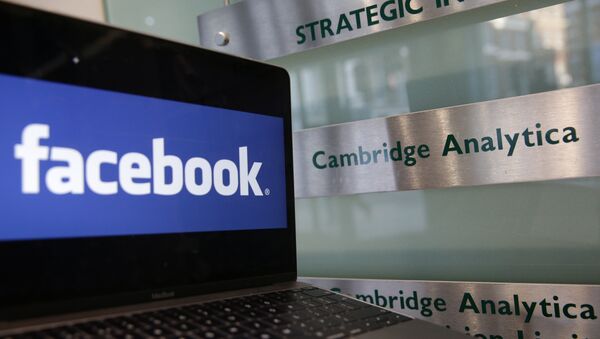Sputnik discussed the ongoing investigation into Cambridge Analytica with James D.J. Brown, Associate Professor and Academic Program Coordinator for International Affairs, Temple University, Japan Campus.
Sputnik: Now this story gets more intriguing with the company filing for bankruptcy, Cambridge Analytica has published a statement in which it said that it's been vilified for legal activity, what’s your opinion about their statement and wanting to take bankruptcy then?
James D.J. Brown: They’ve complained that they’ve been under a media siege which has made their business impossible and they feel vilified for activities that they say are legal, we’re not sure yet, we can’t say for certain whether they have broken the law or not, but there is certainly a widespread belief that some of their practices were unethical and the main things there are the fact that it’s claimed that they use the data of tens of millions of Facebook users without those users permission, and also the CEO of the company Alexander Nix was caught on tape saying that the company would be willing to use unethical means, including bribes and honey traps, in order to smear political opponents, so I suppose it’s an indication of the fact that if you are going to run a successful business it’s not just about staying within the letter of the law, it’s also about maintaining the company’s reputation.
Sputnik: Now investigators have said that they will still pursuing individuals and directors despite the firm's closure, in your view, what are they hoping to find? What are they hoping to achieve? Is this some kind of campaign against this company now?
James D.J. Brown: I suppose the prosecutors would say that just because the company has shut down doesn’t mean that any criminal activity that has been undertaken can just be forgotten about, so they’ll be looking into whether the company has violated election law in both the US and elsewhere, for example, for using personal data without permission, and also there are some other more specific things in the US to do with whether non-US citizens have been employed to work on American election campaigns, and also I think that there are some concerns that this company itself, Cambridge Analytica, may have stopped operating but they’re already suggestions that another company, Emerdata, which has some of the same managers involved has already been set up, and that might look to continue the same activities, so I imagine that that’s what some of the prosecutors will be looking at.
Sputnik: Can you explain to our listeners what are the mechanisms behind acquiring data from social media users for political campaigns? And how is this data used in these campaigns?
James D.J. Brown: Well this is where Cambridge Analytica claim that what they’re doing is not really so different, so for the last two years one of the biggest things in political campaigns is to have the micro targeting of voters, and actually this is something that they Obama campaign is widely credited for, for using media and gathering information, and being able to target users in a more direct way that would be impossible previously, so Cambridge Analytica say that essentially they were just doing the same thing but whilst the Obama campaign was credited for doing it they were criticized, and there are some suggestions because they were working for the Leave campaign in the UK and also assisting with the Trump campaign and that’s why they were receiving this additional criticism, but I think this case is different though because how they receive the data was different, it’s a fairly complicated situation but it seems that Facebook gave the data to an academic working at Cambridge University who subsequently sold the data on to Cambridge Analytica, so that meant that Facebook users and indeed Facebook itself were not aware of how this data was ultimately going to be used.
Sputnik: It was reported that data was improperly passed from Facebook two Cambridge Analytica, what did they mean by improper, is there a proper way to pass this information? We all know, we’re all users of Facebook, when we’re going on to these specific applications they’re asking us for information, our authority to gain access to our Facebook account whether it’s adapting to photos or to some music files, so in the scheme of things all these companies out in the wider global audience have access to our information, are they being regulated? I suppose some companies are complying with regulation and some companies are abusing the information, is that the case then, is it?
James D.J. Brown: I think the issue here is that if you are a sensible user of Facebook or other social media you realize that you’re getting a free service and in return you're sharing your data with that company, the company benefits from use of that data but I think what is, perhaps, different here is, as I say, Facebook passed on this information to an academic and then it was sold on, and I think that most users do not have an awareness that that's how data might be used. There’s an additional element too, that it wasn’t just individual users who had given some consent for their information being used, it was also the friends on the broader network of people who were associated with the initial group that’s why this is seen as improper, and also Facebook has been heavily criticized for what seems as a week response. It seems that Facebook became aware of this issue in late 2015 but it didn’t alert users to the problem, and it only took quite limited steps to deal with it, so that’s why Facebook has received quite a lot of criticism over this including the CEO, Mark Zuckerberg, been called to testify in front of Congress.
The views and opinions expressed in this article are those of the speaker and do not necessarily reflect those of Sputnik.

